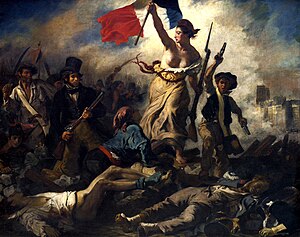This is an old revision of this page, as edited by 212.219.204.172 (talk) at 08:17, 25 May 2006 (→See also). The present address (URL) is a permanent link to this revision, which may differ significantly from the current revision.
Revision as of 08:17, 25 May 2006 by 212.219.204.172 (talk) (→See also)(diff) ← Previous revision | Latest revision (diff) | Newer revision → (diff)
The French Revolution (1789-1799) was a pivotal period in the history of French, European and Western civilization. During this time, republicanism replaced the absolute monarchy in France, and the country's Roman Catholic Church was forced to undergo a radical restructuring. While France would oscillate among republic, empire, and monarchy for 75 years after the First Republic fell to a coup d'état, the Revolution is widely seen as a major turning point in the history of Western democracy—from the age of absolutism and aristocracy, to the age of the citizenry as the dominant political force.
Causes
Many interrelated political and socioeconomic factors contributed to the French Revolution. To some extent, the old order succumbed to its own rigidity in the face of a changing world. It fell to the ambitions of a rising bourgeoisie, allied with aggrieved peasants, wage-earners, and individuals of all classes who had come under the influence of the ideas of the Enlightenment. As the revolution proceeded, and as power devolved from the monarchy to legislative bodies, the conflicting interests of these two once-allied groups would become the source of conflict and bloodshed.
Causes of the French Revolution include the following
- A poor economic situation and an unmanageable national debt were both caused and exacerbated by the burden of a grossly inequitable system of taxation and France's funding of the American Revolution;
- A resentment of royal absolutism;
- An aspiration for liberty and republicanism;
- A resentment of Manorialism (seigneurialism) by peasants, wage-earners, and, to a lesser extent, the bourgeoisie;
- The rise of enlightenment ideals;
- Food scarcity in the months immediately before the revolution;
- High unemployment and high bread prices resulting in the inability to purchase food;
- A resentment of noble privilege and dominance in public life by the ambitious professional classes;
- A resentment of religious intolerance;
- The failure of Louis XVI to deal effectively with these phenomena.
References
![]() This article incorporates text from a publication now in the public domain: Chisholm, Hugh, ed. (1911). Encyclopædia Britannica (11th ed.). Cambridge University Press.
This article incorporates text from a publication now in the public domain: Chisholm, Hugh, ed. (1911). Encyclopædia Britannica (11th ed.). Cambridge University Press. {{cite encyclopedia}}: Missing or empty |title= (help)
This article incorporates text from the public domain History of the French Revolution from 1789 to 1814, by François Mignet (1824), as made available by Project Gutenberg.
Further reading
- Doyle, William. Oxford history of the French Revolution, 2nd ed., Oxford: Oxford University Press, 2002 ISBN 0-19-925298-X
- Doyle, William. Origins of the French Revolution, 3rd ed., Oxford: Oxford University Press, 1999 ISBN 0-19-873175-2, ISBN 0-19-873174-4 (pbk.)
- Furet, François. La révolution en debat, Paris: Gallimard, 1999 ISBN 2-07-040784-5
- A short but important book with a series of articles on the historiography of the revolution
- Hibbert, Christopher. The Days of the French Revolution, New York: Morrow Quill Paperbacks, 1981. ISBN 0-688-00746-5 (pbk.)
- A very well researched classic of the genre available in many bookstores.
- Legrand, Jacques. Chronicle of the French Revolution 1788-1799, London: Longman and Chronicle Communications, 1989 ISBN 0-582051-94-0
- The English-language edition of the collaborative work Chronique de la Révolution 1788-1799, Paris: Larousse, 1988 ISBN 2-03-503250-4, produced under the direction of Jean Favier and others.
- Loomis, Stanley. Paris in the Terror, June 1793 – July 1794, Drum Book, 1986 ISBN 0-931933-18-8
- McPhee, Peter. The French Revolution, 1789-1799, Oxford: Oxford University Press, 2002 ISBN 0-19-924414-6
- A short but up-to-date and useful book which covers many areas including feminism and environment etc.
- Sobel, Robert. The French Revolution (1967)
- Tackett, Timothy. Becoming a Revolutionary: the deputies of the French National Assembly and the emergence of a revolutionary culture (1789-1790), Princeton, N.J.; Chichester: Princeton University Press, 1996 ISBN 0-691-04384-1
- The most thorough research on the deputies of the Estates General and the National Assembly.
- Vermeil, Jean. L`autre Histoire de France, Paris: Editions du Félin, 1993 ISBN 2-86645-139-2
- "The exactions of the revolutionaries in the Vendée" (Chapters 13 to 16). (In French)
External links
- The Musée de Veygoux is a museum in Auvergne dedicated to the French Revolution and Desaix